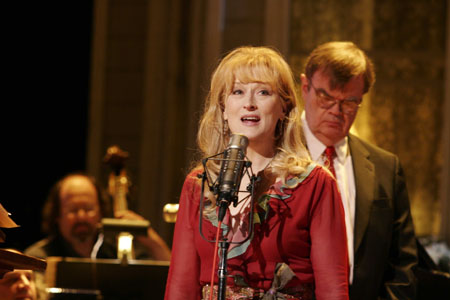« Art School Confidential (2006) – Movie Review | Home | Superman Returns (2006) – Movie Review »
A Prairie Home Companion (2006) – Movie Review
By Robert L. Jones | June 16, 2006

Why did I ever let my agent talk me into working with this big, dumb Scandahoovian? I wish this oaf would stop ogling my ass!
It’s Sucking My Will to Live!!!
[xrr rating=1/5]
A Prairie Home Companion. Starring Woody Harrelson, Tommy Lee Jones, Garrison Keillor, Kevin Kline, Lindsay Lohan, Virginia Madsen, John C. Reilly, Maya Rudolph, Meryl Streep, and Lily Tomlin. Screenplay by Garrison Keillor, based on a story by Garrison Keillor and Ken LaZebnik. Directed by Robert Altman. (Pictrehouse, 2006, Color, 105 minutes. MPAA Rating: PG-13.)
Movie buffs still hotly debate whether Don Siegel’s 1957 cult classic Invasion of the Body Snatchers is a cautionary allegory against McCarthyism, or against communism. I have a different take.
For years, I’ve observed button-down suburbanite neighbors zip around their gated communities in Volvos, while their urban counterparts in the subways hold half-folded copies of the New York Times in one hand and a Starbucks latte in the other as they head into the city for another day’s gray labor.
Yeah, they all seem human. But little clues tip me off that they may be the “Pod People” living among us, undetected.
Observe the truncated and polished facial mannerisms—their lips move only a few millimeters when simulating a smile, or when assuming an expression signifying displeasure. Neither do their voices modulate much—just a fraction of a decibel separates detached caution in their voices from full-throated reserve.
But, the dead-giveaways are those canvas tote bags in which they haul their daily rations of organic fruits, and the ceramic coffee mugs that dispense their designer coffees and teas. On these, embossed, you can see the secret symbol that identifies these metrosexual cyborgs to each other:
“n p r.”
A parasitic entity that feeds off the lifeblood of its hard-working, tax-paying hosts, National Public Radio broadcasts messages that can be deciphered only by such artificially engineered clones. For news reports about their unwitting dupes, they perk their ears to the calm, deceptive monotony of “All Things Considered.” So that they can be seen “listening” to music, they fill their office cubicles, at around volume level “3,” with the restrained sounds of mostly Mozart (though never anything so gauche as Don Giovanni) and Bach (though never anything so vulgar as Stokowski’s orchestration of Toccata and Fugue)
And when these bloodless creatures return in the evenings to their ethnically cleansed, gentrified lofts, they “entertain” themselves with the gentle “humor” of Garrison Keillor’s homey little corner of NPR-land, “A Prairie Home Companion.” Since it requires of its listeners very little laughter, APHC provides them with further camouflage, helping them maintain the public pretense that they are actually human beings, possessing not only a sense of humor, but even souls.
Well, anyway, that’s my conspiracy theory. How else to explain how an oafish dullard like Keillor could convince a segment of the population that he’s Mark Twain reincarnated, and that his monumentally tiresome nattering about the equally dull folk of some lake in Minnesota is fraught with “irony”?
So when I heard that Robert Altman was slated to direct this movie, I thought: “Wow! I’m sure glad they got him to breathe some friggin’ life into this dreck!” After all, Altman has graced the screen with some of its most memorable treasures, from the Burt Lancaster/Gary Cooper Western Vera Cruz (1954) to the raucous World War II flick The Dirty Dozen (1967). Two of his classics, Flight of the Phoenix (1965) and The Longest Yard (1974), have even been remade recently.
Then, I suddenly realized: “Wait a minute, dummy: that was Robert Aldrich! Robert Altman was the guy who directed M*A*S*H (1970), one of the few comedies in movie history to have to ride the coattails of the TV sitcom it spun off to get any viewers.”
Still, I decided to give this pic a chance anyhow, going in with such low expectations that I was sure to be pleasantly surprised. No dice. What I found instead was a trite, befuddled, pointless cinematic mess that made my earlier expectations seem like cockeyed optimism.
What, you may wonder, is this movie about? Well, it’s about an hour and three-quarters. Seriously, though, let’s take Keillor at his word: “It’s the kind of program that died fifty years ago, only someone forgot to tell the performers.” For sure. In reality, it’s about as authentic as the manufactured quaintness of a Cracker Barrel Restaurant: If you’re not paying too close attention, or if Alzheimer’s has set in, you might actually believe that the old-fashioned country crafts really are made by backwoods hillbillies, and not by slave labor in some Chinese factory.
A Prairie Home Companion brims with allegory. Well, to be nice, let’s call it that. The plot has Keillor’s ensemble of Hee Haw! wannabes putting on their last show at the F. Scott Fitzgerald Theatre in St. Paul, broadcast on station WLF, which the script implies is being run by Mom and Pop from their kitchen table, and not by the governmental bureaucracy at Minnesota Public Radio. However, a real greedy Texan (Get it?), subtly named “The Axeman” (Tommy Lee Jones), cometh to shut them down. Oh, if only some angel in the wings would waft in to put all this greedy, budget-cutting Evil to a halt, so that Keillor could continue to delight audiences in perpetuity…
To convince his listeners—and hopefully, the dreaded Axeman—Keillor and crew put on a show to end all shows. Truly. I’ve never seen such an ensemble of gifted and acclaimed thespians acting their hearts out: Kevin Kline, Woody Harrelson, and Meryl Streep give inspired performances.
Unfortunately, they are inspired performances of an excruciatingly amateurish script. I think Keillor learned his screenwriting craft from one of those correspondence courses that they advertise on matchbook covers. The dialogue is embarrassingly stilted, the character development utterly absent. The confused staging is filmed by director of photography Edward Lachman, a one-note Johnny who appears to have learned his sole trick of moving the camera in lateral dollying—left-to-right, then right-to-left—at the Mr. Miyagi Sand the Floor School of Cinematography.
Virginia Madsen plays the movie’s pivotal role, a rather earthy, sensual Angel of Death who’s been sent to off you-know-who. She’s convincing and nuanced, but her blocking is so clumsy that if you turned off the sound, you’d swear she could be cast as a tree in one of those elementary school Thanksgiving plays that parents are forced to attend. By the end of the movie, I found myself screaming inwardly at Madsen: “Kill this movie! Drive a stake through its heart! For the love of Christ, release me from this tedium!”
So the NPR Pod People have now invaded The Cinema, too. Mercifully, though, this film was screened only at “select” venues that run independent films. And it’s still not too late to put up blockades and prevent their trucks from delivering DVDs of this life-sucking movie to video stores in your hometown. For if you don’t, Kevin McCarthy’s doomed prophesies from the original Body Snatchers may still come to pass:
“Look, you fools. You’re in danger. Can’t you see? They’re after you! They’re after all of us! Our wives! Our children, everyone! They’re here already! YOU’RE NEXT!”
Robert L. Jones is a photojournalist living and working in Minnesota. His work has appeared in Black & White Magazine, Entrepreneur, Hoy! New York, the New York Post, RCA Victor (Japan), Scene in San Antonio, Spirit Magazine (Canada), Top Producer, and the Trenton Times. Mr. Jones is a past entertainment editor of The New Individualist.
Topics: Black Comedies, Comedies, Independent Films, Movie Reviews | Comments Off on A Prairie Home Companion (2006) – Movie Review
